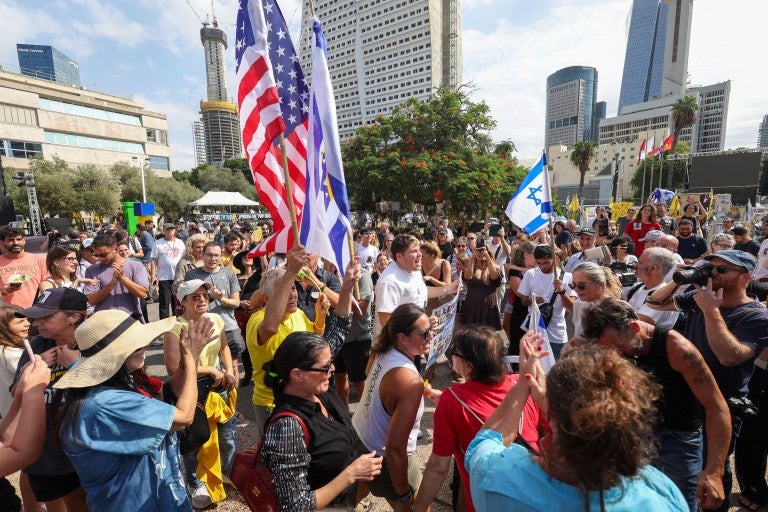August 16, 2021 — New York
This piece originally appeared in The Jerusalem Post.
Before the United Church of Christ General Synod adopted a resolution panning Israel, the American denomination demanded that the United States end its “illegal occupation of the Hawaiian Islands.”
Reaffirming the group’s commitment “to stand alongside and in support of the efforts of Native Hawaiians to seek redress and restitution for the war crimes of the U.S. against the Hawaiian Kingdom,” the General Synod directed the UCC’s general counsel to communicate the church’s position on the 50th state to “local, national and international leaders and organizations.”
No democratic nation is perfect, and the U.S. has been atoning for a long time, and still is, for its maltreatment of some minorities. But the Hawaii resolution, like the one in support of the Palestinians, showed the UCC penchant for siding with select aggrieved populations. Of course, native Hawaiians do not seek an end to the U.S., as some Palestinians do of Israel.
The Israeli-Palestinian conflict has been a longstanding favorite in the biennial General Synod, the denomination’s national decision-making body, which has sought to end what it calls “Israel’s occupation of Palestine.” Last month the group did not disappoint its adherents or others who believe Israel is singularly responsible for the current situation. It generated yet another resolution condemning Israel in many ways while never asking the Palestinians to also take responsibility and do something to resolve the conflict, to advance peace.
Berating Israel has been at the top of the UCC agenda for decades. This year’s 3,500-word resolution had a preamble with a summary of actions taken in prior General Synods that included the church’s support for the BDS movement, especially divestment from and boycotts of Israel, and calls for ending U.S. aid to Israel, along with other punitive measures targeting Israel.
The preamble referenced a 1973 General Synod resolution affirming that “peace and security can be attained only” through a political settlement that takes into account “the right to existence of the State of Israel and the rights of the Palestinian Arabs.” If that was an indication of support for a negotiated two-state solution, it is a UCC historical relic, and was absent from the 2021 resolution. There is no longer any pretense of UCC balance when it comes to the Israeli-Palestinian conflict and the State of Israel.
At the 33rd General Synod in July the church took a very different approach than its approach heretofore. Instead of framing the conflict in political terms, it focused on theological interpretations grounded in a document issued in July 2020 by Kairos Palestine, the Palestinian Christian group that actively solicits American Christian denominations, including the Presbyterians, Methodists, and UCC. “Cry for Hope: A Call for Decisive Action,” the Kairos document, proclaimed that “support for the oppression of the Palestinian people, whether passive or active, through silence, word or deed, is a sin.”
This year’s Synod statement “is not just a call to action. It is, centrally, a confession of faith and principles,” wrote Hans Holznagel on the UCC website in May, ahead of the July virtual conference. The resolution, “Declaration for a Just Peace Between Palestine and Israel,” adopted on July 18 by a vote of 462 to 78, declared “Israel’s continued oppression of the Palestinian people a sin in violation of the message of the biblical prophets and the Gospel.” It firmly rejected “the notion that Israel’s occupation of Palestine is a purely political problem.”
Notable is the lack of clarity of what constitutes Palestine in the view of the UCC. The “text of the motion,” following the preamble, opens with “whereas for over seventy years Palestinian people have faced dispossession of their land.”
This view that the “occupation” began not in 1967 but in 1948 is the conviction of extremist Palestinians, notably Hamas, who firmly believe that the Jews are colonial intruders, have no connection to the land, and must be expunged. In the entire UCC Declaration there is no mention of Hamas, which has governed Gaza since 2007, is committed to Israel’s destruction, opposes any peace initiatives, and in May initiated another conflict by firing thousands of rockets indiscriminately at Israel’s cities.
The UCC Declaration rejects “the imposition of so-called peace agreements by Israel or the United States,” but does not identify any of them while totally ignoring genuine peace offers by Israel, with American support, that have been consistently spurned by the Palestinian Authority.
The latest UCC resolution is a disservice to those truly committed to achieving durable Israeli-Palestinian peace and no doubt will be enshrined in the permanent record of UCC policy towards Israel. Other Protestant churches may well emulate the UCC’s new theological approach when they convene next year and, as they do regularly, prepare and adopt statements condemning Israel.
Repetitions of accusations and judgments do not make them any truer and certainly do not advance peace.
The writer is the American Jewish Committee’s director of media relations.



